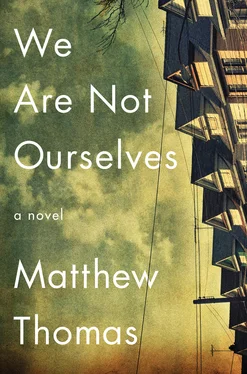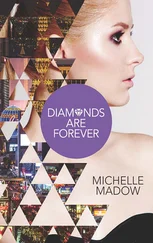He saw the distant mob at the finish line as though through the wrong end of a telescope and wanted to step to the side and vomit. A large pack of runners passed him, calling on some mysterious reserve. He could hardly keep his head up.
He heard his father’s voice before he saw him. “Come on, Connell,” his father shouted gently through cupped hands. “Come on, son.”
He took deep breaths and flung his legs out before him as though they didn’t fit and he wanted to return them to their rightful owner. He gained on the pack a bit. A wall of cheers rose up as the finish line neared. He wanted to come through with the others. There wasn’t much time left to catch them. It wasn’t the first pack; those guys were resting already, turning over spray-painted gold in their hands. What it was was a little cluster of competitors. There may or may not have been medals left to fight for. They always gave out so many: thirty, fifty, God knew how many. The top quarter, the top third. Gold ones, silver ones. Then bronze. Then nothing. Coach Amedure got annoyed if anyone asked how many would be handed out that day. “Why do you care?” he’d say. “Why do you want to feed off the bottom?”
He caught up to the cluster, barely. They were funneled into the rope cordon. Plenty of medals remained. Hunching over, trying to catch his breath, he watched the officials hand them out. Each subsequent medal cheapened his own a little. When the medals ran out, runners came in to less fanfare. Individual voices could be heard in the din. The crowd at the finish line began to thin.
The laggards came trickling in. Among them was Rod, upright and stiff, like a totem pole come to life. Rod’s reedy father screamed at him in frustration and the other voices around hushed at once. The harangue continued after Rod had crossed the finish line. People looked away, embarrassed for the boy, and Coach Amedure tapped his pen at his clipboard in impotent censure.
“What’s that boy’s name?” Connell’s father asked.
“Who, him?” Connell said. “Rod.”
“Stay here.”
Connell nervously watched his father go over to where Rod and his father were standing.
“It’s Rod, right?”
Rod nodded.
“What do you want?” Mr. Henni asked sharply. “I’m talking to my son.”
“I was wondering, Rod,” Connell’s father said, ignoring him, “if you wouldn’t mind posing for a picture with me.”
Rod looked surprised but answered “Not at all!” while Mr. Henni was stunned into silence. Connell’s father handed the camera to Stefan, who looked around in embarrassment before getting ready to take the picture. Connell couldn’t believe what was happening, how much awkwardness could attach itself to a single moment. He rushed over and took the camera from Stefan and framed the shot as fast as he could. His father and Rod were smiling; you’d never know what had been going on moments before. Connell pressed the button once; then he went to Coach Amedure to find out what place he had finished in. The coach looked away in disdain as he showed Connell the clipboard.
• • •
A kid from Connell’s grade, Declan Coyne, rode the train down from Bronxville with him. He started taking Connell around with him on the weekends.
“You look like a guido,” Declan said. “You need to look like a prep.”
“Okay.”
“That mock turtleneck, for one. You need to wear a different shirt. Something with an actual collar. Rugby shirts are fine. Polo shirts. Button-downs.”
Declan had grown up in town and had gone to St. Joseph’s. He knew all the Fordham Prep and Bronxville High kids in the area, and he fit in with them easily. They didn’t care that he was a distinguished piano player; what they cared about was that he’d been the goalie on the Empire State Games soccer team during eighth grade. They probably also noticed the MG Declan’s father parked in the driveway on sunny days.
“That spiky haircut — no way,” Declan said. “All that hair gel. Let your hair grow. Part it on the side.”
Declan’s unruly curls peeked out from under his cap, which said U.S. Open. Even Connell’s Mets cap didn’t make the grade; it was the height of naïveté to wear a baseball cap that represented an actual baseball team.
“And those pants. You look like you’re jumping out of a plane. Do you see anyone else around here wearing Z Cavaricci or Bugle Boy? You don’t want all these pockets and loops. You could be a construction worker in that outfit. Just buy jeans, regular jeans, not those acid-washed atrocities.”
Connell’s mother had bought him the jeans Declan hated. Connell couldn’t help noticing how Declan’s mother seemed to get every detail right: pressing his school pants neatly; wrapping his sandwiches tightly in wax paper so that they resembled Christmas presents; lining up, alongside a bright bag of mini carrots that practically screamed good health, two perfectly round, homemade chocolate-chip oatmeal cookies. She even folded his napkins into neat triangles. And it wasn’t just when Declan was at school that no seams were visible: Connell couldn’t believe how neat and perfect-looking everything at Declan’s house was. His own house had never looked like the Coyne house. Then again, his mother had always had a full-time job.
“And don’t tight-roll the bottoms either. That’s totally guido.”
He imagined he looked to Declan like a member of an indigenous tribe that had just come into contact with civilization.
“Throw out those Reebok Pumps. Get some deck shoes. Bass is fine. And nobody wears tighty-whities. Boxer shorts. Only boxer shorts.”
“Boxer shorts.”
“No exceptions. I can’t be emphatic enough about this.”
“I’ll get them.”
“And get some soccer shoes. Adidas Sambas.”
“I don’t play soccer.”
“That’s because you don’t know what’s good for you,” he said. “Everybody plays soccer. Get some soccer shoes.”
“Won’t I look like I’m trying too hard?”
“Would you rather look like you’re not trying at all?”
• • •
The park ran alongside the Bronx River. Its western border was the Bronx River Parkway. Palmer Road lay to the south, Pondfield Road to the north. Trees lined its major path, and broad stretches of grass made up its main terrain. At night kids gathered in it to drink.
There wasn’t much crime in town. The police were always driving up onto the lawn from the Parkway to take the kids by surprise, sending an under-aged exodus toward Palmer Road. He’d seen them leaving the park in a hurry and wondered how he would ever hang out with these kids.
Declan led him to a large group gathered a little ways from the path. Most of the guys, Declan said, went to Fordham Prep; a couple went to Iona; a few went to Bronxville High. The girls went to Ursuline, Holy Child, or Bronxville. There were older guys too: college students, dropouts, guys who had never gone to college and were working jobs.
One guy held a flashlight up to his own face as Declan introduced Connell, so that his features jumped out spookily. He had a fleshy face situated atop a pink-and-white-striped Oxford shirt. His eyes looked bloodshot. Declan said he was a senior at Fordham.
“Here,” the guy said. “Have a beer.”
He pulled a bottle out of a six-pack sleeve and handed it to Connell, who felt he couldn’t refuse. He tried to twist off the top.
“Let me get that for you.” The guy popped the cap off with an opener on his key chain. Declan waved over a guy who looked about Connell’s age.
“Brewster, Connell,” Declan said.
“So you go to school with this kid?” Brewster pointed to Declan.
“Yeah,” Connell said, “but I’ll probably fail out. I’ll probably wind up at Fordham. I don’t want to work all the time.”
Читать дальше
Конец ознакомительного отрывка
Купить книгу












